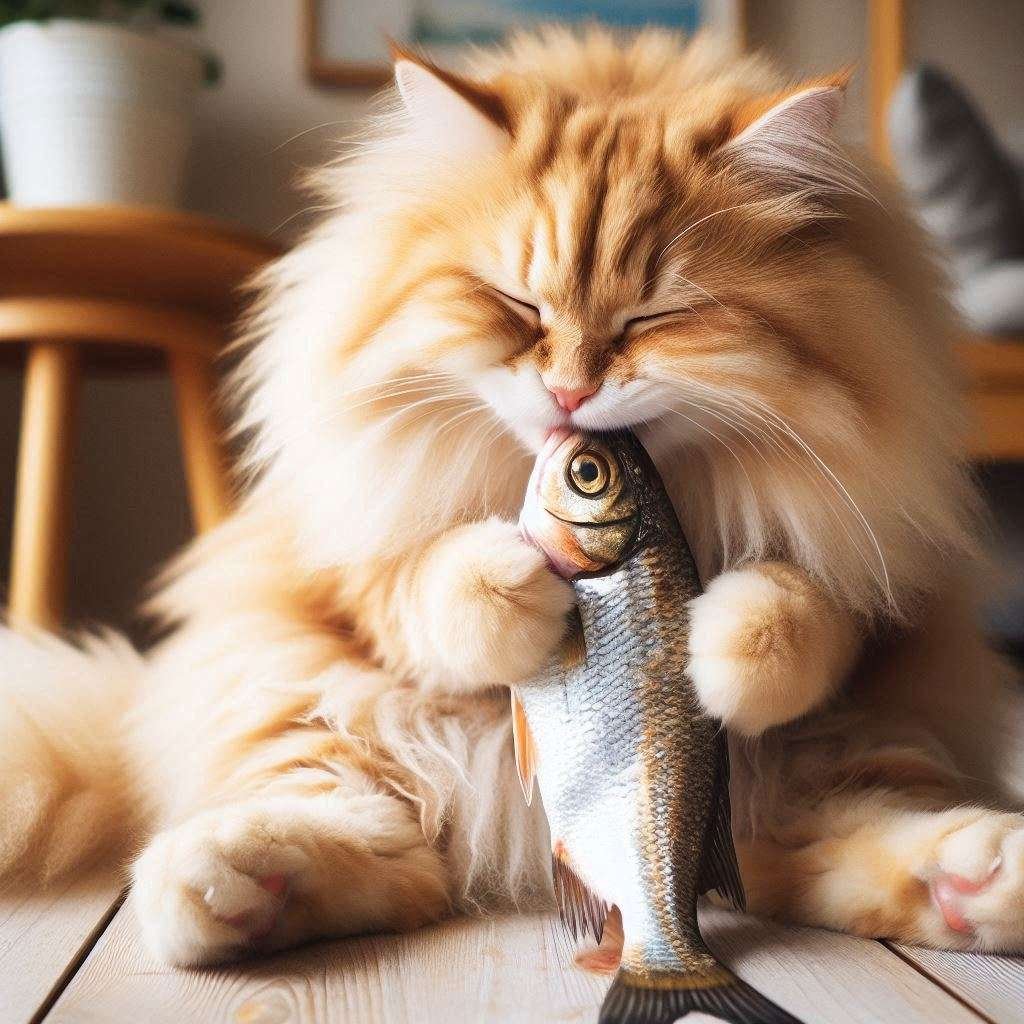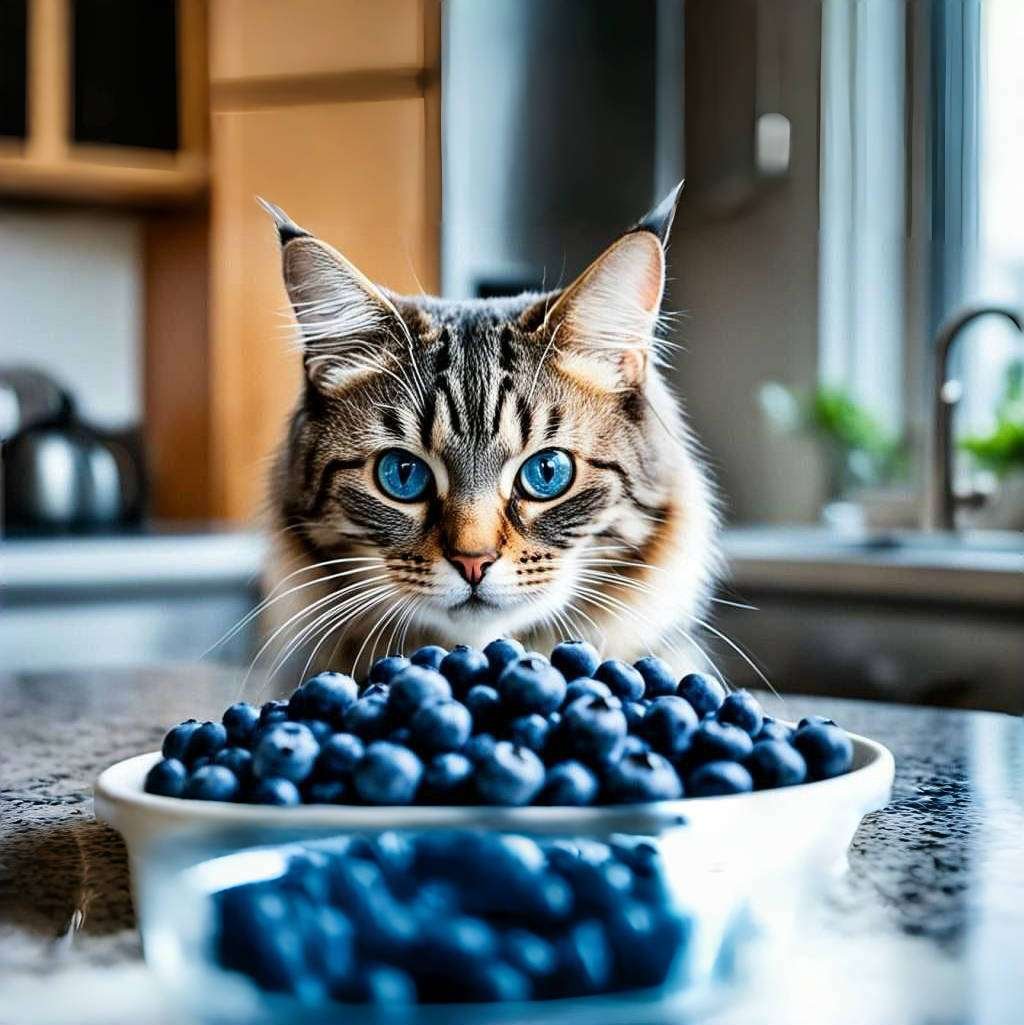Watermelon is a favorite fruit in the summer for its cool taste and hydration. But, when you share it with your cat, you might wonder if it’s safe. Can cats eat watermelon? Yes, but in small amounts, but remember to take out the seeds. Seeds have cyanide, which is bad for cats.
Watermelon isn’t toxic to cats, but it’s not super good for them either. It’s high in sugar, so it’s not great for cats that are overweight or have diabetes.
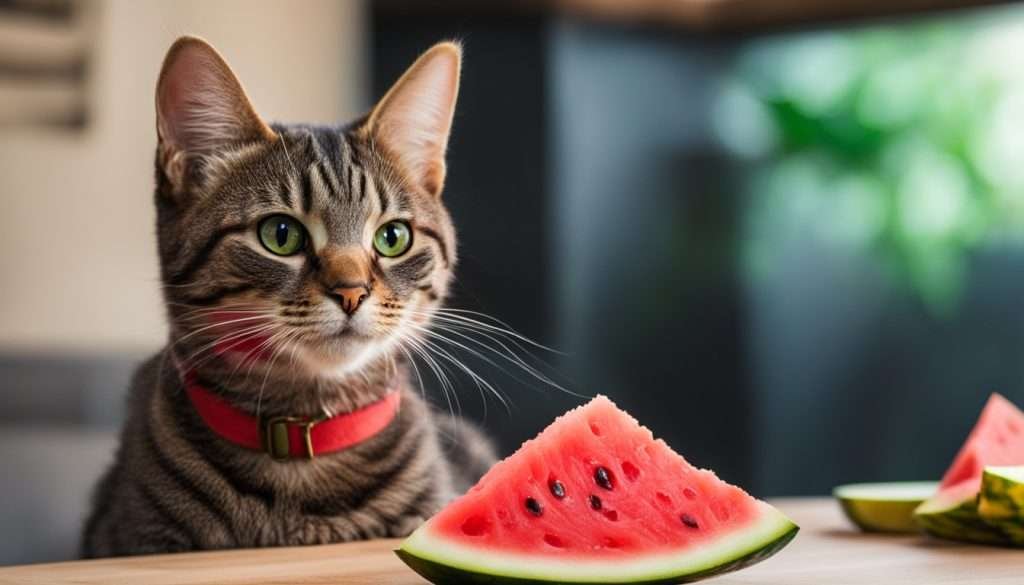
Key Takeaways
- Watermelon can be a refreshing treat for cats, but it should be given in moderation.
- Cats should avoid watermelon seeds and rinds, as they can pose choking and digestive hazards.
- Overweight or diabetic cats should not consume watermelon due to its high sugar content.
- Watermelon should be served in small, bite-sized pieces to prevent choking.
- Cats are obligate carnivores, and watermelon should not replace their balanced, meat-based diet.
Watermelon: A Refreshing Summer Treat
Introduction to Watermelon and Its Popularity
Watermelon is a favorite during the summer. It’s a refreshing and hydrating treat for humans and pets alike. This fruit has a thick, green skin that covers juicy, red pulp with seeds inside. It comes from West Africa, where it was first grown on vines.
China grows most of the world’s watermelon, making up 68% of production. Turkey, Iran, and Brazil also grow a lot of it. Watermelon is very water-rich, up to 92%. It’s also fat-free, low in sodium, and has about 40 calories per cup.
“Watermelon is a beloved summertime staple, offering a refreshing and hydrating treat for both humans and pets.”
Watermelon is full of good stuff like Vitamin A, B6, C, and Lycopene. It also has Potassium, antioxidants, and amino acids. This makes it great for pets’ health during the summer.
Can Cats Eat Watermelon?
Watermelon might look like a cool summer snack, but it’s key to know if it’s safe for our cats. Cats need a special diet because they are obligate carnivores. Watermelon might not give them everything they need.
Cats can have a little bit of watermelon, but it shouldn’t be a big part of their diet. It’s mostly water, which can help them stay hydrated. It also has vitamins and minerals like A, C, B1, B6, potassium, magnesium, and antioxidants. But, the sugar in watermelon can be bad for cats that are overweight or have diabetes.
Watermelon seeds have cyanide, which is toxic to cats if they eat too much. The rind is hard for cats to chew and digest. This can lead to choking or stomach problems.
- Cats are obligate carnivores, meaning their digestive system is made for meat.
- Watermelon can be a safe, hydrating treat for healthy cats and kittens, but only in small amounts.
- Cats with diabetes or obesity should not have watermelon because of its sugar.
- Some cats might get sick from the carbs and sugars in watermelon, like vomiting or diarrhea.
- Watermelon seeds have cyanide, which is toxic to cats if eaten a lot, and can choke them.
- Most cats don’t like the sweet taste of watermelon because they don’t have taste glands for it.
Sharing a small bit of watermelon with healthy cats is okay sometimes. But, it shouldn’t replace their regular, high-quality cat food. Always watch how your cat reacts to new foods and talk to your vet if you’re worried.
Nutritional Benefits of Watermelon for Cats
Hydration and Essential Vitamins
Watermelon is a great way to keep cats hydrated, especially when it’s hot. It’s full of water, which is perfect for cats. Plus, it has vitamins and minerals that are good for their health.
It’s packed with vitamins A, B6, and C. These vitamins are key for a cat’s health. It also has potassium and magnesium. These help with their immune system, skin, and energy.
| Nutrient | Benefits for Cats |
|---|---|
| Vitamin A | Supports eye health, immune function, and skin and coat quality. |
| Vitamin B6 | Aids in protein metabolism and nervous system function. |
| Vitamin C | Enhances the immune system and helps with wound healing. |
| Potassium | Maintains healthy muscle function and heart health. |
| Magnesium | Supports bone health and energy production. |
But remember, watermelon isn’t a full meal for cats. Cats need a balanced diet made for them. They need the nutrients from animal proteins to stay healthy.
When giving watermelon to your cat, give it in small amounts and watch how they react. Always talk to your vet before trying new foods for your cat.
Preparing Watermelon for Your Feline Friend
If you want to give your cat watermelon as a treat, make sure to prepare it right. Watermelon can be a great snack for cats, keeping them hydrated and happy. But, you need to prepare it safely for them.
- Wash the watermelon flesh thoroughly to remove any dirt or residues.
- Remove all seeds from the watermelon, as they can pose a choking hazard and may contain cyanide, which is toxic to cats.
- Cut the watermelon into small, bite-sized pieces that are easy for your cat to chew and digest.
- Avoid offering the watermelon rind, as it can be difficult for cats to chew and may cause digestive issues.
Cats can be picky about what they eat. So, start with a little bit of watermelon to see if they like it. This helps you know if they can handle it or not. Watch for signs like vomiting or diarrhea, which mean watermelon might not be good for your cat.
Preparing watermelon right lets you give your cat a safe and healthy snack. It can help with hydration and give them vitamins and a cool taste in the summer. Always watch how your cat reacts and adjust the amount you give them.
“Moderation is key when it comes to feeding watermelon to your cat. Treats should make up less than 10% of their daily caloric intake, so a small slice or a few cubes can be a delightful addition to their diet.”
Moderation is Key
Feeding watermelon to your cats needs moderation. Follow the 10% treat rule. This means treats, like watermelon, should make up only 10% of their daily calories. The rest should come from balanced cat food.
Give watermelon in small pieces and watch how your cat reacts. Too much can cause stomach problems like upset or diarrhea.
The 10% Treat Rule and Portion Control
Cats need a diet high in animal proteins. Watermelon can be a nice treat but shouldn’t replace their main food. One cup of watermelon has about 45 calories. Make sure the treats don’t make up more than 10% of their daily calories.
Talk to your vet to find out how many calories your cat needs. Then, adjust the watermelon amount. This helps avoid weight gain and health problems from eating too much watermelon.
Cats react differently to foods. Be careful when giving them watermelon. Watch for signs like vomiting or diarrhea. If you see these, stop giving them watermelon and talk to your vet.
“Moderation is the key when it comes to feeding watermelon or any other human food to your cat. It’s crucial to follow the 10% treat rule and work closely with your veterinarian to ensure your cat’s dietary needs are met.”
By following the 10% rule and controlling portions, you can give your cat watermelon safely. This way, they can enjoy it as a special treat while staying healthy.
Potential Risks and Precautions
Watermelon can be a cool treat for cats in the summer. But, it’s important to know the risks and be careful. Cats need a diet full of animal proteins to stay healthy. Watermelon doesn’t give them the nutrients they need.
Feeding cats watermelon can be risky because of the seeds. These seeds have a bit of cyanide, which is bad if eaten too much. Also, the seeds and rind can block their throat or cause stomach problems if eaten. Make sure to take out all seeds and rind before giving watermelon to your cat.
Watermelon has a lot of sugar, which is bad news for cats with diabetes or who easily gain weight. Cats with these issues should not have watermelon. It can make them sick with stomach problems or diarrhea. Cats with diabetes do better with fruits like blueberries that have less sugar.
- Watermelon seeds can be a choking hazard and contain trace amounts of cyanide, which can be harmful if consumed in large quantities.
- The high sugar content of watermelon may cause digestive issues, diarrhea, and other health problems, especially for cats with diabetes or weight concerns.
- Cats are obligate carnivores and may not derive significant nutritional benefits from the plant-based nutrients in watermelon.
- Watermelon rind can also pose a risk of gastrointestinal blockages if swallowed by cats.
Make sure to remove all seeds and rind before giving watermelon to your cat. Watch your cat for any bad reactions. Talk to your vet before adding watermelon or any new food to their diet.
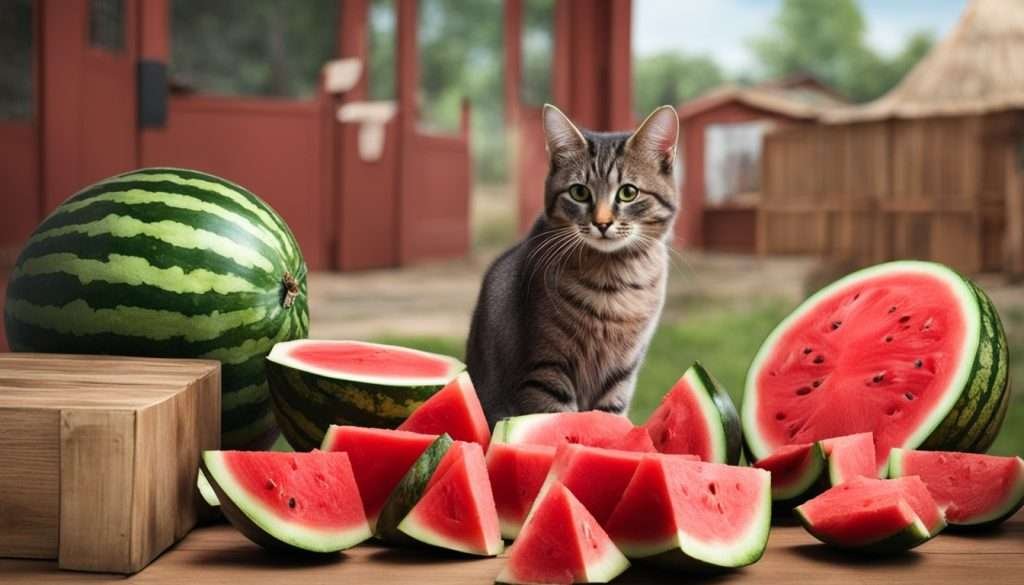
Knowing the risks and being careful lets you enjoy watermelon with your cat safely. Always remember, give it as a rare treat, not as a main part of their diet.
Cats and Watermelon: Individual Preferences
When it comes to cats and watermelon, each cat is different. Some cats love the juicy, refreshing taste of watermelon. Others might not like it at all.
Cats don’t taste things the same way humans do. They might not enjoy the sweetness of watermelon. It’s important to let your cat decide if they want to eat it.
Watermelon has about 1 calorie per teaspoon, making it a low-calorie treat. But remember, treats should only be 5 to 10 percent of a cat’s diet. Give watermelon to your cat in small amounts to avoid stomach problems.
Vets say to give your cat the flesh of the watermelon and skip the seeds. Seeds have cyanide, which is bad for cats. Choose seedless watermelons to be safe. Also, don’t give your cat the watermelon rind because it can choke them.
Watermelon is okay for cats in small amounts, but watch how your cat reacts. Talk to a vet if you have concerns about your cat’s health or diet.
“Watermelon is a refreshing treat, but it’s important to remember that each cat has its own unique preferences and sensitivities.”
Deciding if your cat can have watermelon depends on their likes and health. Knowing the good and bad can help you make a choice that’s best for your cat. This way, you can make sure your cat enjoys watermelon safely and happily.
can cats eat watermelon?
Yes, cats can eat watermelon in small amounts as a treat. It’s not toxic to them. But, make sure to remove the seeds and rind first. Watermelon can help with hydration and offer some nutrients, but it shouldn’t replace their main diet. Be careful with it, especially for cats that are overweight or have diabetes.
Watermelon is safe for cats, but they don’t need it for their diet. Cats get all the nutrients they need from their regular food. Still, watermelon can be a fun and cool treat for them if given in small amounts.
Cats should not get more than 10% of their daily calories from treats. One cup of watermelon has about 45 calories. So, keep the portions small. Cats should mainly eat foods made just for them, with treats like watermelon given only sometimes.
Cats don’t really like sweet foods because they’re not programmed to. They might not be as into watermelon as some other fruits. Also, don’t let them eat the seeds because they can choke or have cyanide, which is bad for them. Stick with seedless watermelon for your cat.
Watermelon can help with hydration and give some extra nutrients, but talk to a vet before giving it to your cat. This is especially true if your cat has health issues. Always remember, moderation is important with cats and treats like watermelon.
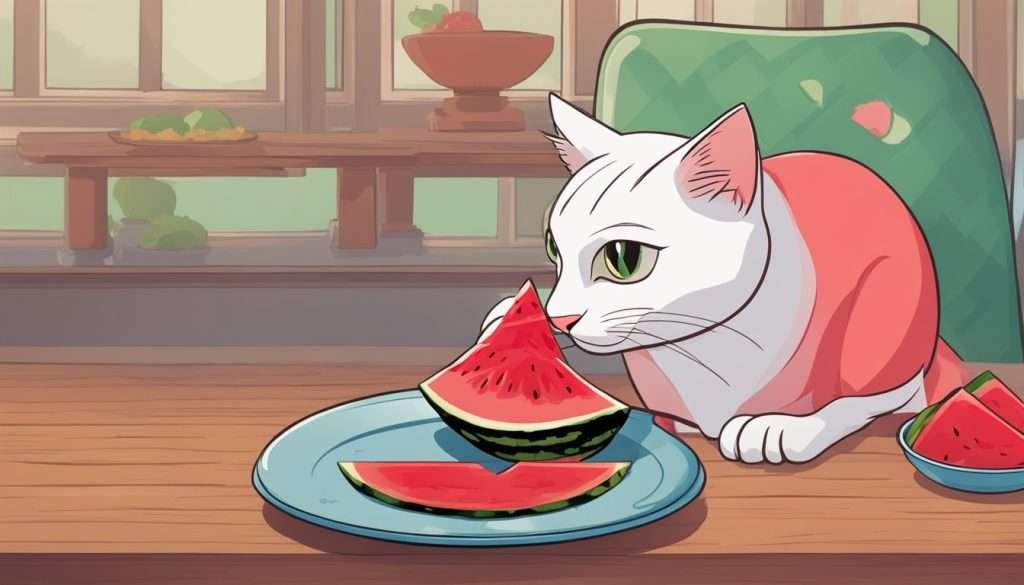
Alternative Fruit Treats for Cats
Watermelon is a great treat for cats, but there are other fruits they can enjoy too. Cat owners should try different cat-safe fruits to give their pets a varied and healthy treat selection.
Berries like blueberries and strawberries are excellent alternative fruit treats for cats. They are low in sugar and full of antioxidants. Dr. Sarah Wooten, DVM, CVJ, from Silverthorne, Colorado, says, “Strawberries, in moderation, can be a fun and perfectly acceptable treat for cats. They are a good source of fiber, vitamins, minerals, and antioxidants.”
Cats can also enjoy crisp apples and creamy bananas in small amounts. Bananas are great because they’re full of potassium. This helps with healthy joints and brain function.
| Fruit | Potential Benefits for Cats | Recommended Portion Size |
|---|---|---|
| Blueberries | Rich in antioxidants, fiber, and vitamins | About 5-10 berries per day |
| Strawberries | Good source of fiber, vitamins, and minerals | 1-2 small strawberry slices per day |
| Apples | Contain vitamins and fiber, can help with dental health | 1-2 small, unsweetened apple slices per day |
| Bananas | High in potassium, support joint and brain health | 1-inch piece of banana per day |
When giving your cat new cat-safe fruits as healthy cat treats, start with small amounts. Some cats might not like new foods and could get upset. So, it’s best to watch how they react before giving more.
Feeding your cat a mix of alternative fruit treats and good cat food is best. This way, they get all the nutrients they need to stay healthy.
When to Avoid Watermelon for Cats
Watermelon can be a refreshing treat for cats in small amounts. But, there are times when it’s better not to give it to them. Cats with certain health issues or dietary needs might not do well with watermelon. It’s important to know when it’s okay to give it and when to avoid it.
Cats with Health Issues
Cats that are overweight or have diabetes should not have watermelon. Its high sugar can make their health problems worse. The carbs in watermelon can also upset their stomachs, leading to diarrhea or vomiting.
Cats with sensitive stomachs or health problems may react badly to watermelon. Always talk to your vet before adding new foods, like watermelon, to your cat’s diet. This is very important if they have health issues.
Watermelon Rind and Seeds
The flesh of watermelon is usually safe for cats in small amounts. But, the rind and seeds can be risky. The tough rind can cause choking or blockages in the intestines. Watermelon seeds have cyanide, which is harmful to cats.
To keep your cat safe, remove the rind and seeds before giving them watermelon. Only give them the sweet flesh as an occasional treat. Make sure the portions are right.
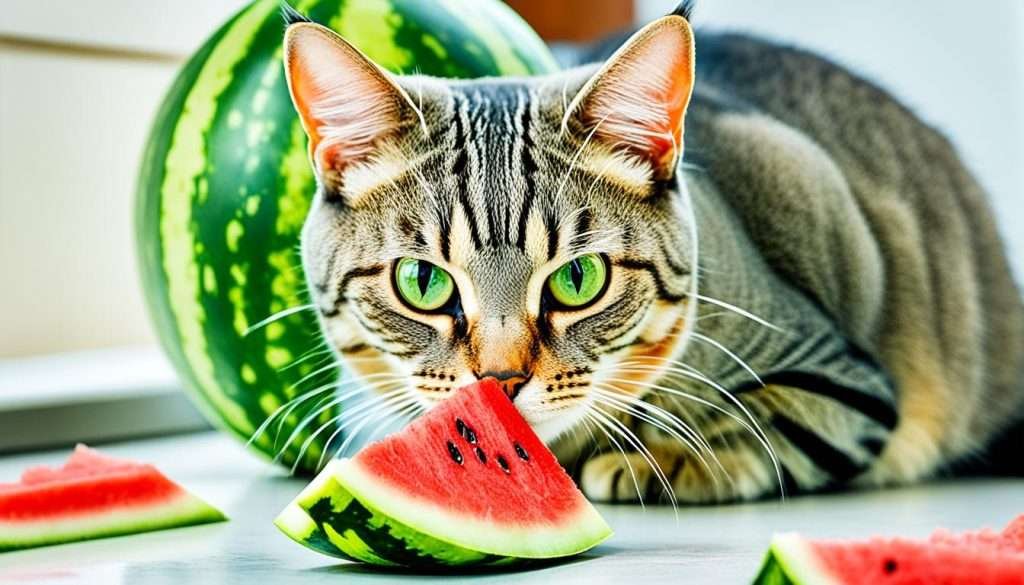
Cats need a diet rich in meat and proteins because they are obligate carnivores. Watermelon can give them some hydration and vitamins, but it shouldn’t be a big part of their diet. Always watch how your cat reacts to new foods and talk to your vet to make sure they are healthy.
Conclusion
Cats can have watermelon as an occasional treat, but it should be given in small amounts. Watermelon can help with hydration and offer some nutrients. However, it shouldn’t replace their main diet.
When giving watermelon to your cat, make sure to remove the seeds and rind. Start with a little bit to see if they like it and can handle it. It’s a good idea to talk to your vet, especially if your cat has health issues or special diet needs.
Remember, when feeding watermelon to cats, keep it to a minimum. Be aware of the risks and focus on a complete and balanced diet for your cat. With care, watermelon can be a nice summer treat for your cat. But it shouldn’t be a big part of their diet.
FAQ
Can cats safely eat watermelon?
What are the nutritional benefits of watermelon for cats?
How should watermelon be prepared for cats?
How much watermelon should I feed my cat?
Are there any risks associated with feeding watermelon to cats?
Do all cats enjoy the taste of watermelon?
Are there any other fruits that are safe for cats to eat?
When should I avoid feeding watermelon to my cat?
Source Links
- Is Watermelon Good for Cats?
- Sweet Treats: Can Cats Eat Watermelon Safely? | PetPlace.com
- FoodFact: Can Pet Dogs or Cats Eat Watermelon?
- Can Cats Eat Watermelon? Vet Approved Nutrition Facts & FAQ – Catster
- Can Cats Eat Watermelon? Read Before You Feed | Purina
- Can Cats Eat Watermelon? Here’s Everything You Need to Know

